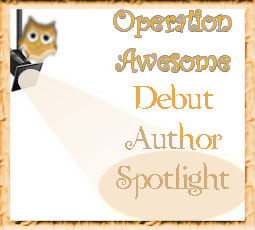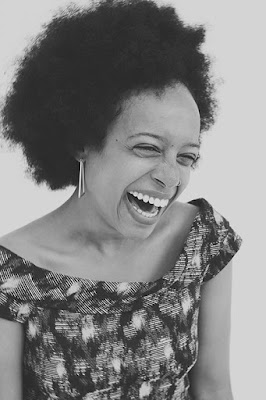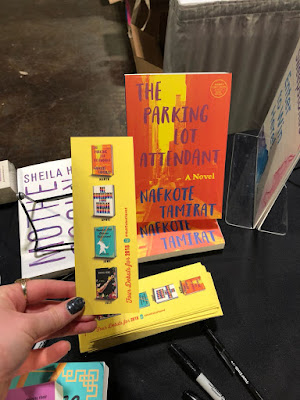
The Parking Lot Attendant by Nafkote Tamirat
1- What is your favorite cheese?
The best one: burrata. Any other favorite cheese is problematic.
2- What five words represent your most notable characteristic or values? #In5Words
Humor, sensitivity, pride, words, quickness
3- What ignited your passion for writing?
Reading books and listening to people tell stories. I’ve been reading non-stop since I learned how and was by all accounts a fairly humorless child, who didn’t really know how to interact with anyone outside of my immediate family. I remember being fascinated by how some people could use their words to make others laugh and pay attention, and I desperately wanted to have that gift. I started by filling composition notebooks with stories about girls who were disliked but secretly brilliant (along with levity, I also lacked subtlety in my youth) as well as one ill-conceived piece about a school photographer who hated children, which I believe I thought was hilarious. I was mistaken.
4- Would you share a picture with us of your book with something distinctly Ethiopian?

5- What are some of your short and long term writing goals?
To write as much as possible (fiction, essays, etc.) and to keep improving and growing throughout.
6- Can you tell us about your thoughts and feelings when you found out your book was featured in the May issue of O The Oprah Magazine?
I grew up watching Oprah with my mom and over the years, my admiration and respect for what she does has only become more profound. It took me a few days to digest the fact that my book was in her magazine, alongside other fantastic authors and then I blacked out from joy. I still haven’t recovered.
7- What is your favorite book (by someone else), and what do you love most about that book?
I’m going to cheat and name two recent favorites: the Neapolitan Novels by Elena Ferrante and The Argonauts by Maggie Nelson. With the former, I couldn’t catch my breath fast enough to follow the incredible narration, the sweeping scale of events, the characters who felt like people I knew, the extraordinary depiction of intense female friendship over a lifetime. With the latter, I was struck by the way in which grief and creation (of a person, a piece of writing, a life) were brought together so intimately and beautifully. I’ve always loved how Nelson rejects the binary in favor of diving into the uncomfortable grey areas that permeate the issues that most matter.
8- What was the best thing about using your native city of Boston in your book?
My feelings towards Boston are complicated: I grew up in a community that was almost incidental to the existence of the city itself; Bostonians love the city with a passion that I find difficult to wrench up from my depths; Boston remains a very insular city where the people who “belong” all look the same. Writing and thinking about Boston for over six years, while living in a different country, and putting my part of Boston into my own words allowed me carve out a place for myself in my hometown, ironically when I was the farthest I’d ever been from it.
9- Who is currently your biggest fan? What does that person love most (or "ship") about your debut novel?
I think my mom is perpetually my biggest fan in basically everything I do and with this book, I think she’s overjoyed it’s a real thing that people can find at bookstores and not just a delightful fantasy that I continue to entertain.
10- What emotions do you hope your book will evoke for the reader, and is there a particular scene you hope will resonate with readers?
I hope that anyone who reads the book enjoys the story and following the journeys of these characters who have been living in my brain for years. If during that process, they’re compelled to question preconceived notions, look around their community a bit more closely, read more books about Ethiopians, read more books by Ethiopians and other members of the African diaspora, then I will feel honored and delighted.
11- What most helped you to improve your writing craft?
The fiction MFA program I did at Columbia University BUT I do not think that completing such a program is necessary to becoming a good writer. When I arrived at Columbia, I was pretty sure I was the best living writer under the age of 30 and by having fellow students and teachers gently (and sometimes not so gently) show me the flaws in my stories, I gradually became a better editor of my own work and began to understand the kinds of questions I needed to ask myself and potential readers in order to improve. I’m lucky enough to have friends who will read drafts for me, along with an amazing agent and editor, but even before I send work to them, there are many, many rounds of editing I do on my own, which I’m only capable of doing because of the time I spent reading and critiquing the writing of others and having them return the favor. I think it can only help to cultivate relationships with people who are willing to read your work, suggest things, disagree with other things and ultimately, help you push past your initial fears and limitations.
12- Could you tell us something about living in Paris that might surprise people?
Paris is one of the best cities to launch your affordable and informal cinema education, thanks to an unlimited movie card, available for €21 a month. Once you have that, you can see as many movies as you want in almost every single movie theater in the city, including venues that exclusively show classic movies or independent movies, meaning that you can watch a silent movie from the 1930s and then a Marvel movie on the same day. Paris is also one of the rare European cities that almost always provides subtitles for movies instead of dubbing them and that regularly shows both the latest and the oldest movies from around the world. There are many things about the city that annoy me (The bureaucracy! The lack of spicy food!) but then I remember my unlimited card and I’m like, oh, I may never leave.
13- What is the most memorable trait or visual oddity of one of your characters?
I once wrote a story about a girl with a star tattoo on her face (one of my less successful experiments but the character has stuck with me, so I might give it another go). I also wrote a story called Our Pharmacy where one of the main characters, Alga, follows up almost everything she says with the question, Do you believe me? It starts as a funny quirk but ends as a way to bully others into never daring to doubt her credibility.
14- In what ways are the main characters in your book diverse? https://diversebooks.org #WeNeedDiverseBooks
All of the main characters in my book are Ethiopian or Ethiopian-American and while the novel is written in English, we are to understand that the dialogue occurs in Amharic, except in conversations with Americans or non-Ethiopians. Some census reports estimate that there are over half a million people of Ethiopian descent living in the US, and there are more and more Ethiopian artists coming into the spotlight. Nonetheless, many people still think “famine” when they hear “Ethiopia” (if they even know what it is at all). I’m not trying to shame those people (much) but rather, want to point out that like many groups in the US which contribute a great deal to their host country in terms of labor, creativity, political capital, etc., Ethiopians are still an unknown quantity to many. I hope that my book can help bring a fascinating culture and people to the attention of those who have yet to receive the good word about injera and Teddy Afro.
15- Which character has your favorite Personality Contradiction?
The first person who comes to mind is Lee Fiora from Prep by Curtis Sittenfeld. How can someone be so infuriatingly passive and self-absorbed and yet also express so eloquently and sensitively what it feels like to be the person who can’t get out of their own head long enough to feel things as they happen and find a place in the world where they so desperately want to fit in?
16- Does your book hold a mirror up to society, and in what way?
Perhaps in terms of asking the reader to reexamine their notions about what the American Dream “should” mean for immigrants: every single person who decides (or doesn’t) to make the US their home has a different reason, motivation and experience. No one has to feel gratitude for being in America, no one has to love living in America. The American Dream is a choice made by the individual and should never feel like a gift being forced upon you by a nation.
17- Can you think of any small change in the world you could make to benefit hundreds of other authors or readers potentially?
Publicize the books I read and love, especially those written by groups of people who are not usually provided with an extensive platform or widespread exposure. I’ve observed first-hand the difference a few words can make, not only to spread the word about new authors but also to provide encouragement. I have been unbelievably grateful to readers who have contacted me to let me know about how something I wrote affected them, not only for their feedback but also because it makes me feel less alone.
18- As a reader, what most motivates you to buy a new book to read?
It’s a combination of: recommendations from friends, articles about books on the literary and pop culture websites I visit, reviews or recommendations from writers I already follow and books recommended by my dad.
19- How will you measure your publishing performance?
I don’t mean to be precious about this or faux-modest because I am a.) not at all wealthy and would be ecstatic if one of my books became a bestseller and I could buy everyone in my family a mansion and b.) proud of my novel and always happy to see it mentioned in a positive review or list. However, instead of measuring past performance, I would prefer to channel my attention, anxiety and energy into the pieces I’m working on now and the projects I’m planning for the future.
20- What was the deciding factor in your publication route?
I knew very little about the publication process when I started and am still no expert, so I have depended heavily on the wise counsel of my agent, Julia Masnik, and my editor, Caroline Zancan.
21- What's the best book marketing strategy you've come across?
I think word-of-mouth is very effective and I’ve always enjoyed book trailers, although I have no idea how well they work as a marketing strategy.
22- What is one question or discussion topic which you would like the readers of this interview to answer or remark on in the comments?
Do you think The Fast and the Furious movie franchise should dedicate an installment to a story about the gang trying to extricate their cars from a crowded parking lot? If yes, what are your ideas for how to execute this idea, so as to achieve the maximum speed and fury?
23- Anything else you would care to share about your book and yourself?
The Parking Lot Attendant by Nafkote Tamirat



1 comment:
Oh, that picture of Ethiopian food made me drool. One of my favorite cuisines. :-)
Post a Comment